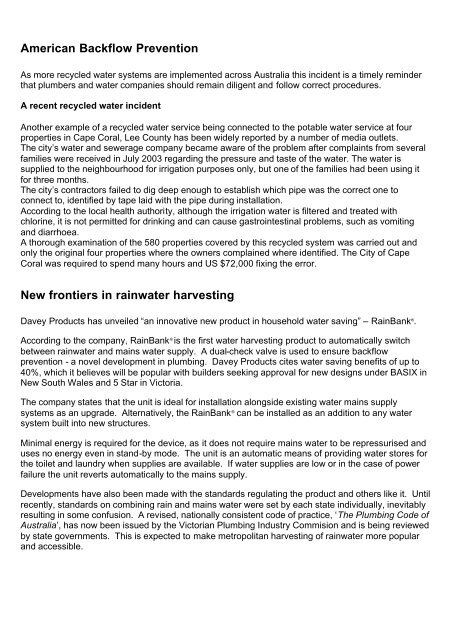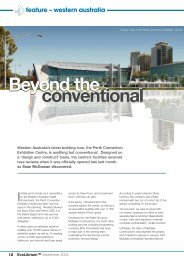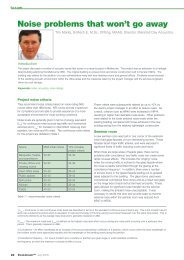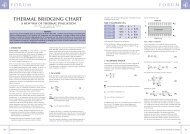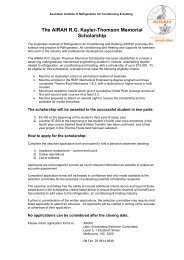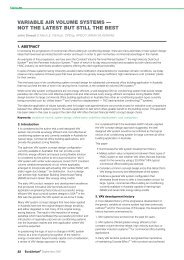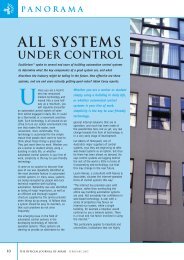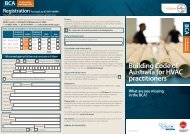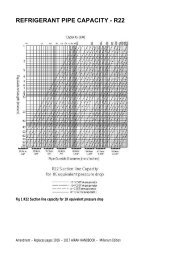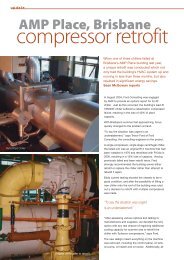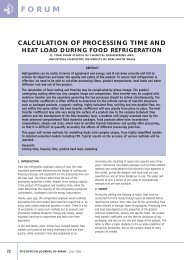BACKFLOW PREVENTION TEST REPORTS - Australian Institute of ...
BACKFLOW PREVENTION TEST REPORTS - Australian Institute of ...
BACKFLOW PREVENTION TEST REPORTS - Australian Institute of ...
You also want an ePaper? Increase the reach of your titles
YUMPU automatically turns print PDFs into web optimized ePapers that Google loves.
American Backflow Prevention<br />
As more recycled water systems are implemented across Australia this incident is a timely reminder<br />
that plumbers and water companies should remain diligent and follow correct procedures.<br />
A recent recycled water incident<br />
Another example <strong>of</strong> a recycled water service being connected to the potable water service at four<br />
properties in Cape Coral, Lee County has been widely reported by a number <strong>of</strong> media outlets.<br />
The city’s water and sewerage company became aware <strong>of</strong> the problem after complaints from several<br />
families were received in July 2003 regarding the pressure and taste <strong>of</strong> the water. The water is<br />
supplied to the neighbourhood for irrigation purposes only, but one <strong>of</strong> the families had been using it<br />
for three months.<br />
The city’s contractors failed to dig deep enough to establish which pipe was the correct one to<br />
connect to, identified by tape laid with the pipe during installation.<br />
According to the local health authority, although the irrigation water is filtered and treated with<br />
chlorine, it is not permitted for drinking and can cause gastrointestinal problems, such as vomiting<br />
and diarrhoea.<br />
A thorough examination <strong>of</strong> the 580 properties covered by this recycled system was carried out and<br />
only the original four properties where the owners complained where identified. The City <strong>of</strong> Cape<br />
Coral was required to spend many hours and US $72,000 fixing the error.<br />
New frontiers in rainwater harvesting<br />
Davey Products has unveiled “an innovative new product in household water saving” – RainBank ® .<br />
According to the company, RainBank ® is the first water harvesting product to automatically switch<br />
between rainwater and mains water supply. A dual-check valve is used to ensure backflow<br />
prevention - a novel development in plumbing. Davey Products cites water saving benefits <strong>of</strong> up to<br />
40%, which it believes will be popular with builders seeking approval for new designs under BASIX in<br />
New South Wales and 5 Star in Victoria.<br />
The company states that the unit is ideal for installation alongside existing water mains supply<br />
systems as an upgrade. Alternatively, the RainBank ® can be installed as an addition to any water<br />
system built into new structures.<br />
Minimal energy is required for the device, as it does not require mains water to be repressurised and<br />
uses no energy even in stand-by mode. The unit is an automatic means <strong>of</strong> providing water stores for<br />
the toilet and laundry when supplies are available. If water supplies are low or in the case <strong>of</strong> power<br />
failure the unit reverts automatically to the mains supply.<br />
Developments have also been made with the standards regulating the product and others like it. Until<br />
recently, standards on combining rain and mains water were set by each state individually, inevitably<br />
resulting in some confusion. A revised, nationally consistent code <strong>of</strong> practice, ‘The Plumbing Code <strong>of</strong><br />
Australia’, has now been issued by the Victorian Plumbing Industry Commision and is being reviewed<br />
by state governments. This is expected to make metropolitan harvesting <strong>of</strong> rainwater more popular<br />
and accessible.


